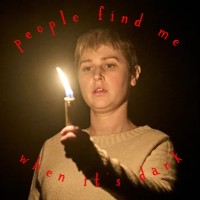Because Sadie seemingly never eats, drinks or sleeps, and as the séances start to bring back her memories, they also bring back supernatural abilities: The Glow (because the title The Shining was already taken.) And with them, some unexpected punishments for Evelyn and Mason's mistreatment of her.
SPOILER ALERT for this paragraph especially, as it's hard to say much about the rest of the story without giving away the sudden left turn the play takes away from a ghost story into wider mythical fantasy: Sadie, more commonly known as Brook but essentially nameless, appears human but is unique, an immortal who's existed long before humanity but longs for their company. But for the most part when humans have discovered her true nature - which she herself doesn't really understand, even when she gets her memory back - they've banished, destroyed her or, like Edward III, tried to steal her immortality. But even when she's been burnt as a witch or cut into pieces, The Glow allows her to heal and continue with her lonely life, whether she really wants to or not.
Vicky Featherstone's production is hugely atmospheric - Merle Hensel's set is an imposing black stone prison with moving walls, which Jessica Hung Han Yun's lighting fills with ominous shadows, and Nick Powell's sound design is equally moody. At first this is all in service of the misdirect about this being a horror story, but in the second act it works just as well at maintaining the air of mystery (and as I suggested at the start, a mystery McDowall has no intention of solving for us.)
Tal Rosner's projections are largely there to help the audience navigate the times and places the story takes us to; McDowell's plays have generally liked playing with telling the story out of order, but here that extends to how the protagonist actually experiences life: We may follow Brook backwards and forwards through the millennia, but she also has a limited ability to time-travel through her own lifetime in the same way, bringing people with her either to help or punish them: In the late 20th century Brook will befriend a retired nurse (Ayola,) so in 1348 she transports injured knight Lord Haster (Tadhg Murphy) forward for medical treatment. The comically domestic set up she ends up in with Haster is a rare instance of humanity actually giving her the positive attention she craves.
As far as my personal interpretation goes, I saw The Glow in part as a meditation on loneliness and trying to belong: As Brook bemoans being the only one of her kind, the nurse reminds her that everyone feels that way. On a wider scale Brook feels like a timeless figure from mythology who could slot into the Arthurian legends, and when she meets a failed academic (Akinade) in the 1970s, he's found multiple references to the mystery woman in art and literature over the centuries, and sees the different ways she's depicted as a mirror of the times†.
So a further interpretation could be of Brook as a symbol and barometer of the nation, and The Glow as a look at when an abstract symbol has to navigate reality - one thing the play isn't short of is opportunities for discussion and interpretation‡. Richard, who often gets annoyed when shows get too surreal, also really liked The Glow: Regardless of the amount I've written about it it's surely best seen knowing as little about it as possible, so writer, cast and creatives can screw with your mind and expectations as much as they clearly relish doing.
The Glow by Alistair McDowell is booking until the 5th of March at the Royal Court's Jerwood Theatre Downstairs.
Running time: 2 hours including interval.
Photo credit: Manuel Harlan.
*I say English because although the story spans millennia in time, it doesn't feel like it covers much distance; there's a couple of scenes that could theoretically be set in Scotland or Wales, but that's not confirmed, and Brooke only really seems to go anywhere when she's forced to
†the way she's described reminded me of the way the Doctor is described in "Rose," Russell T Davies' first Doctor Who episode; a bit ironic when Akinade has (at time of writing) 20/1 odds of being RTD's next Doctor
‡even as I write this I wonder if the idea of her as a symbol come to life could be extended to her memories before the opening scenes not being real; if, after centuries of being imagined and represented she materialised in the asylum and, through the psychic and later the historian, was able to recreate who or what she is. Although her transporting Haster from the 14th to the 20th century potentially puts a spanner in that theory§
§or not - perhaps it's not that her memories are false, but that even though she wasn't real until the asylum, once she materialised she got inserted back into history as if she'd always been there. Like I say, you can't accuse the play of not giving you enough to theorise about






No comments:
Post a Comment